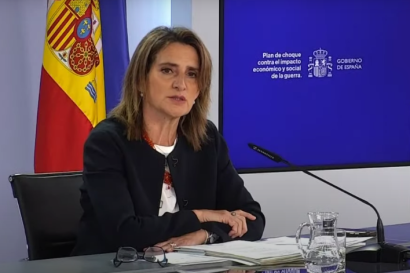This is what Teresa Ribera, Minister of Ecological Transition and Demographic Challenge, defended this morning during the Government control session in the Upper House. Ribera has also pointed out that the European reform, in a complicated moment, allows for stability and visibility in the medium and long term, also allowing for an immediate reaction in the event that there is an emergency, but that it does not have the full scope that there would be. liked by the Government of Spain. “We would have liked, in fact, to alleviate this effect of the marginalist market that pays the highest price,” the minister acknowledged. With the most recent data, from February 2024, Spain continues to register a price (21.2%) lower than the group of large European economies, maintaining a strong discount premium.

The third vice president and minister of Ecological Transition and Demographic Challenge, Teresa Ribera, defended this Tuesday that Spain today offers energy prices in the medium and long term “much more competitive and much lower than those of the rest of Europe”, In response to the question from EH Bildu senator Idurre Bideguren, who asked the minister about how she believes the reform of the energy system approved in the European Union will affect the price of energy as of January 1, 2024, during the Government control session in the Upper House. Teresa Ribera has pointed out that European reform, at a complicated time, allows for stability and visibility in the medium and long term, also allowing for an immediate reaction in the event that there is an emergency.
However, it has recognized that the current reform does not have the full scope that the Government of Spain would have liked, according to Europa Press, since Spain advocates for a comprehensive reform that allows equal development of the storage markets in the 27 Member States. , of the availability to be able to take better advantage of energy transport infrastructures to be able to give continuity and attractiveness to investments in renewable energies, “that are not forced or forced to dump what is not consumed at a certain time.” “We would have liked, in fact, to alleviate this effect of the marginalist market that pays the highest price,” the minister acknowledged. However, he pointed out that Spain has done this through domestic measures, such as the reform of the regulated tariff, providing stability in the medium and long term, incorporating the reference to the market price: “this allows us to see how Spain offers today much more competitive medium and long-term prices, much lower than those of the rest of Europe,” he stressed.
For example, Spain recorded the largest drop in the price of domestic electricity in the first half of 2023, with a drop of 40.6%, in the European Union, therefore being in fifth place with the cheapest electricity in the entire EU. with 0.1823 euros per kilowatt hour (KWh), behind Bulgaria (€0.1137/KWh), Hungary (€0.1161/KWh), Malta (€0.1256/KWh) and Poland (0.1769 €/KWh). The average price of energy in the EU as a whole was then €0.2890/KWh. The Netherlands recorded the highest price in the first half (€0.4750/KWh), followed by Belgium (€0.4350/KWh), Romania (€0.4199/KWh) and Germany (€0.4125/KWh). . With more recent data, from February 2024, the situation remains the same: Spain continues to register a price (21.2%) lower than the large European economies as a whole, maintaining a strong discount premium.
Source: Energias-Renovables.com